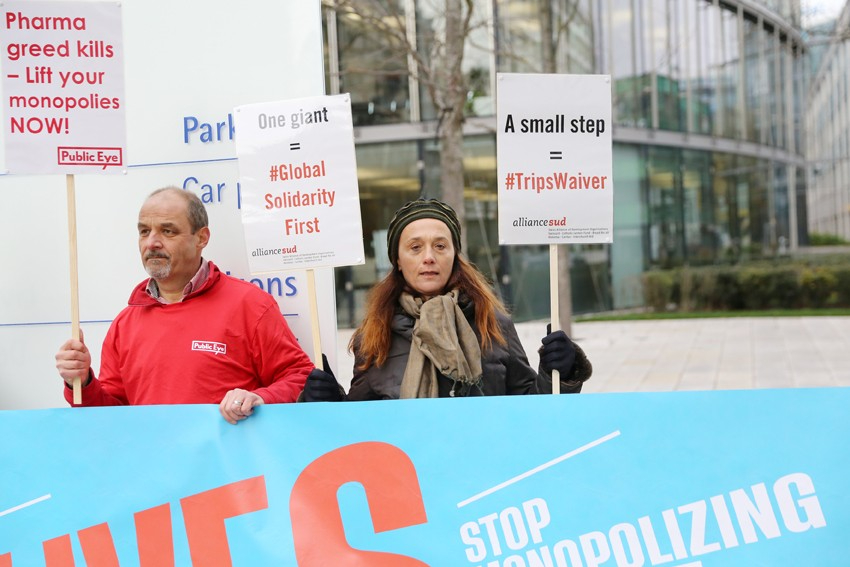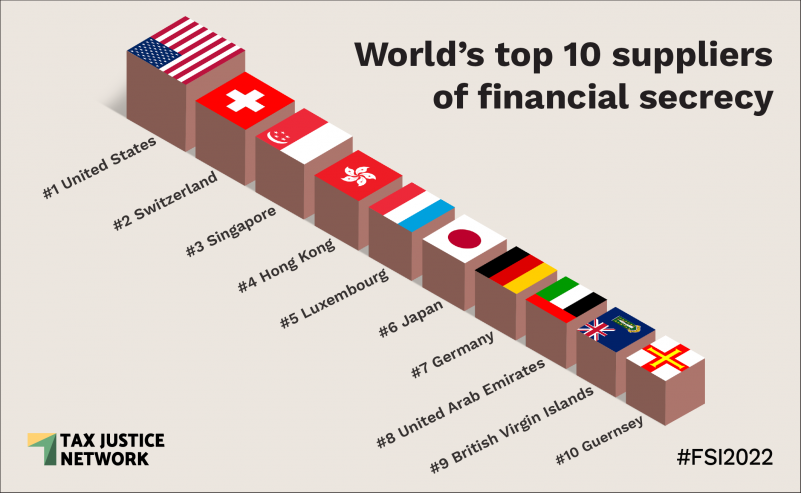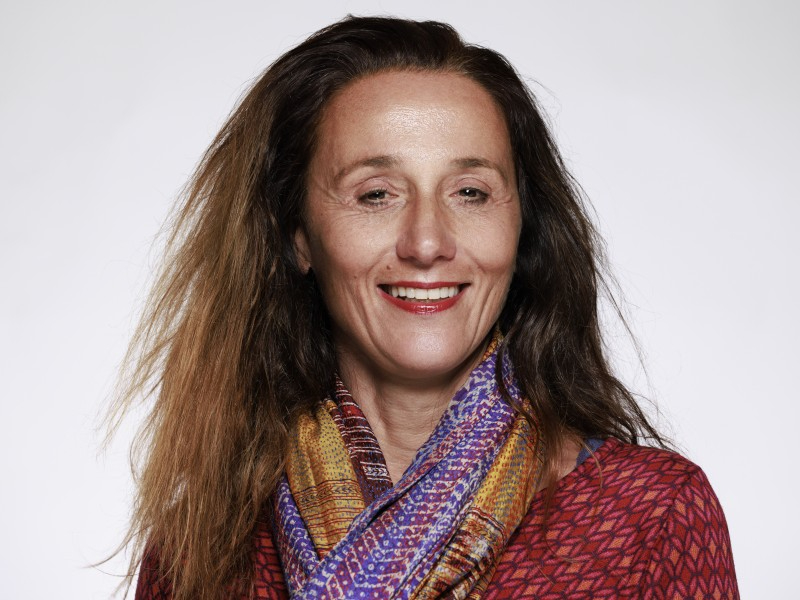Share post now
Press release
Switzerland still one of the darkest corners of the financial world
03.06.2025, Finance and tax policy
In the Financial Secrecy Index published today, Switzerland continues to perform very poorly. Yet, the federal authorities in Bern continue by every means to defend the local financial centre as a contact point for oligarchs, a hotspot for criminal private banks, and a protected space for shady investment advisers. As early as next week, the National Council will again have an opportunity to reverse its position.

© TJN
Yet again, the Swiss financial centre performs rather poorly in the latest Financial Secrecy Index (FSI) put out by the Tax Justice Network (TJN). It ranks behind the USA – which, as is well known, is clearly on the verge of transitioning to oligarchy – still in second place on the list of opaque financial centres around the world. Dominik Gross, Expert on Finance and Tax Policy at Alliance Sud, says the following: "Since the previous edition of the FSI three years ago, Swiss policy has come no closer to its long-standing goal of establishing a clean money strategy for the local financial centre." Together with the notorious Guernsey tax haven, Switzerland has the highest secrecy level among the ten worst-rated financial centres.
Opaqueness no longer good for business
That Switzerland is not the frontrunner in opaqueness, as in the past, is attributable not to greater transparency compared with the USA, but to the fact that its financial centre is smaller than that of the USA. The local players’ share of the global offshore pie is diminishing, yet the lack of transparency is growing. Dominik Gross: "This outcome indicates that Swiss politicians are mistaken if they think that opaqueness still drives the asset management business. On the contrary, politicians are harming it with their outdated hide-and-seek approach."
Summer session: an opportunity for greater transparency
The National Council will have an opportunity for a policy reversal as early as next week. As part of its deliberations on the Legal Entity Transparency Act (LETA), it will be voting on the introduction of a corporate beneficial ownership registry, which is now the international standard. However, the Council of States has so drastically undermined it that implementing it will certainly not enhance transparency in the financial centre, but could even damage it. This protects Russian oligarchs, criminal private banks and shady advisers. Dominik Gross therefore has the following demand: "The National Council should return the draft to its Legal Affairs Committee, thereby forcing it to come up with a better alternative, compared with the Council of States".
For further information:
Dominik Gross, Expert on Finance and Tax Policy at Alliance Sud
Phone: +41 (0)78 838 40 79, Mail: dominik.gross@alliancesud.ch
Gaza: Joint appeal by development organisations
Federal Council must actively support unrestricted humanitarian aid
23.05.2025, International cooperation
The humanitarian situation in the Gaza Strip is disastrous. Swiss development organisations are calling on the Federal Council to endorse the joint declaration by over 20 countries and to immediately do everything in its power to ensure that humanitarian aid can be provided without restriction and impartially.

Trapped in the midst of rubble and ashes: Gaza's population is defencelessly exposed to hunger and ongoing offensives – yet Israel's government is massively restricting humanitarian aid. © Keystone/EPA/Mohammed Saber
Joint press release by Alliance Sud, Caritas Switzerland, the Swiss Church Aid (HEKS/EPER), Helvetas, Terre des hommes, Swissaid, and Solidar Suisse
While the first trucks carrying aid supplies have reached the Gaza Strip again this week, the Israeli government continues to restrict vital aid to the civilian population. The number of trucks currently entering the Gaza Strip is far from sufficient to meet the needs of the 2.1 million residents. Simultaneously, the Israeli army is maintaining its ground offensive initiated at the start of the week. It is conducting air strikes in the densely populated coastal strip, forcing the civilian population to evacuate to increasingly smaller areas. Humanitarian facilities and convoys are repeatedly attacked. The situation of the civilian population has reached catastrophic proportions – decisive, internationally coordinated action is required without delay.
The Israeli plan for the provision of humanitarian aid that has become known in recent days is alarming for several reasons: The goods are to be distributed in four "hubs" exclusively in the south of the Gaza Strip and under the sole control of Israel. Long access routes through unsecured and destroyed areas where fighting is still ongoing are placing people in need and aid workers at risk. Aid would be severely restricted and would only be accessible to those undergoing a security check by the Israeli army. Private security companies are to replace independent humanitarian organisations. This plan fundamentally contradicts the neutrality principle of international humanitarian law and links humanitarian aid to political and military objectives. Humanitarian aid must not be instrumentalised by parties to the conflict.
Caritas Switzerland, the Swiss Church Aid (HEKS/EPER), Helvetas, Terre des hommes, Swissaid, Solidar Suisse, and Alliance Sud are calling on the Federal Council to work for the immediate and unrestricted access to humanitarian aid for the civilian population in need and respect for international humanitarian law at various levels:
- Switzerland must join the joint donor statement on humanitarian aid to Gaza signed by over 20 countries. In this declaration, the foreign ministers of the signatory states – including Germany, Austria, France, Italy, Australia and Canada – call on Israel to "allow a full resumption of aid into Gaza immediately and enable the UN and humanitarian organisations to work independently and impartially to save lives, reduce suffering and maintain dignity."
- This week, the Federal Council expressed its concern about the situation in the Gaza Strip. However, simply showing concern is not enough. The Federal Council must make a strong case to Israel for unhindered access for humanitarian aid and resolutely oppose the erosion of humanitarian principles that can be observed – through all political and diplomatic means.
- The Federal Council must work to ensure that humanitarian principles are fully respected and protected. Independent organisations are needed to ensure that basic principles of humanitarian aid such as neutrality, impartiality and independence can be upheld. This is not guaranteed with the new Gaza Humanitarian Foundation, which is based in Geneva. As the depositary state of the Geneva conventions, Switzerland must firmly distance itself from any attempts to instrumentalise humanitarian aid for political and military purposes.
- The Federal Council must do everything in its power to put an end to the violence and the ongoing destruction. Switzerland must commit to advocating strongly for an immediate ceasefire, the protection of the civilian population in Gaza and the West Bank and the release of civilian Israeli hostages.
The people in Gaza need help – now. This is also urgently evident in the projects of Swiss NGOs with their partner organisations in the concerned areas. Switzerland must live up to its humanitarian tradition and promote strict compliance with international humanitarian law.
Contacts:
Alliance Sud
Marco Fähndrich, responsible for communications and media
079 374 59 73, marco.faehndrich@alliancesud.ch
Caritas Schweiz
Livia Leykauf, media spokesperson
076 233 45 04, medien@caritas.ch
HEKS
Lorenz Kummer, media spokesperson
076 461 88 70, lorenz.kummer@heks.ch
Terre des hommes Lausanne
Cyril Schaub, media relations manager
058 611 07 45, cyril.schaub@tdh.org
Share post now
Press release
OECD contact point: Switzerland lags behind
01.05.2013, International cooperation
If an enterprise infringes the OECD Guidelines for multinational enterprises, a complaint can be filed with the National Contact Point (NCP). These entities operate with varying degrees of seriousness and independence, however.

Share post now
Press release
Responsible Business Initiative handed over
10.10.2016, International cooperation
On 10 October, the Responsible Business Initiative has been presented to the authorities. The 80 NGOs supporting the initiative share one common goal: Swiss quality must incorporate the protection of human rights and the environment.

© Daniel Hitzig/Alliance Sud
Share post now
Press release
Increased corporate accountability blocked
11.03.2015, International cooperation
Following a turbulent debate, the Swiss lower chamber of parliament initially accepted a motion for increased corporate accountability only to repeat the vote and ultimately dismiss the motion.

© Michael Stahl/Keystone
Share post now
Press release
SDG Impact Finance Initiative: impact for whom?
16.03.2022, Financing for development
There is a new SECO initiative designed to mobilise private capital for developing countries. It raises several questions about governance and development impacts.

The two faces of the private sector: on the one hand, it is transporting aid supplies from Zurich to Venezuela in the summer of 2020; on the other hand, Swiss banks are doing business with the elite of the crisis-ridden country, as the "Suisse Secrets" have shown. © KEYSTONE / POOL / Ennio Leanza
On 1 December 2021, the State Secretariat for Economic Affairs (SECO) unveiled the SDG Impact Finance Initiative, a new "public-private partnership for innovative development funding." It is being supported by the UBS Optimus Foundation, the Credit Suisse Foundation and the Swiss Agency for Development and Cooperation (SDC). According to these sponsors, the initiative is expected to raise as much as CHF 1 billion in private capital, in order to achieve "measurable impact in developing countries". SECO is contributing CHF 19.5 million to the initiative, and the UBS Optimus Foundation CHF 5 million; the contributions of the other participants are not yet known.
Blending is trendy
SECO's rationale for the partnership is that the funding gap to meet the Sustainable Development Goals (SDGs) by 2030 is estimated at more than USD 2.5 trillion per year. SECO therefore concludes that "private sector investments in developing countries must be increased in order to bridge this funding gap". Blended financing comprising public and philanthropic funds are seen as an effective way of mobilising private financing, which otherwise would not find its way into the countries concerned. The SDG Impact Finance Initiative aims to raise CHF 100 million from public and philanthropic players by 2030, and those funds will then serve to unlock "up to CHF 1 billion in private capital towards the SDGs in developing countries."
Three objectives have been stated: (1) supporting "innovative financial solutions" for new "impact-investing tools" through grant and seed funding, these being investments which, besides a financial return, also aim to generate positive, measurable social and environmental impact (innovation window); (2) promoting impact investing by mobilising more private capital and strengthening underlying portfolio companies (product window); and (3) contributing to " improved framework conditions for impact investing in Switzerland " and promoting "the quality of impact measurement". To that end, the initiative will work closely with Swiss Sustainable Finance (the umbrella association of financial service providers for the promotion of sustainable financial management) and the State Secretariat for International Finance (SIF).
Let’s open the debate
The launch of the initiative (SIFI) raises numerous questions, first regarding governance and management. An association was established, chaired by a business lawyer, and including one representative from each of the banking foundations that are participating in the SIFI. Neither SECO nor the SDC is represented on the board. It is therefore hard to see how the federal representatives will be able to promote the development priorities that are to be implemented thanks to SECO’s contribution (and in the future presumably also that of the SDC).
Yet another key question is that of defining impact and measurability. To date there has been no universally applicable definition of impact investing, and according to the Organisation for Economic Cooperation and Development (OECD), the boundaries of what may be regarded as impact investing are fluid. To cite the Chair of the OECD-DAC (Development Assistance Committee), "the difficulty lies in defining and measuring this impact. The various countries and public and private organisations use different instruments for measuring different criteria. If the risk of impact washing is to be tackled, public authorities must undertake to lay down standards and monitor their observance." What is more, internationally comparable data and assessment tools are lacking.
The recourse to development cooperation funds (currently CHF 19.5 million from SECO) raises the fundamental question of the Federal Government's role and aims under this initiative; its declared aim "to raise" CHF 1 billion in private funding to finance the SDGs in developing countries presupposes that there are measures to lower the (real or perceived) risks to private investors (de-risking). Such measures may take the form of guarantees, covering first losses, technical assistance for underlying portfolio companies or bearing project preparation costs. These measures are all tantamount to subsidies, the implicit aim of which is to facilitate the preparation of a portfolio of bankable projects that must conform to the risk-return profiles (risk-adjusted return) expected by private and institutional investors. Is the purpose of international cooperation funds therefore to satisfy the growing appetite of investors or – on the contrary – to ensure that the intended and unintended development impacts of investments are measured, monitored and made public?
The question also arises as to the criteria that should apply to the planned investments. Because public donors have so far not laid down a "sustainability framework"[1] for private financing, there is the danger that, with the level of requirements varying so considerably from one investor to another, the ESG criteria (environment, social, governance) may be applied arbitrarily (SDG washing). Besides, there are no indications as to the sectors and countries for which blended financing is intended and the SDGs to which it is meant to contribute. Lastly, this type of public-private partnership raises a number of systemic issues relating to the financialisation of development; the key question that arises when a portion of international cooperation funding is diverted from its original purpose of sustainably funding public goods and services and used as a "lure" and a lever for private investments is the following: does this new use of public funds in fact conform to inclusive development as is being pursued in the 2030 Agenda (leave no one behind)? In other words: how well-suited are these public funds for truly aligning private investments with the goals of sustainable and inclusive development and poverty alleviation? What kind of development is being promoted by this financialization? To what extent can these investments in developing countries contribute to combating inequality, both regionally and between social groups?
The discussion has only just begun.
[1] By indiscriminately incorporating the ambivalent ESG approaches rather than clarifying them individually, the latest reform of the World Bank’s Environmental and Social Framework leaves the door wide open to the danger of SDG washing. See Securitization for Sustainability. Does it help achieve the Sustainable Development Goals? Heinrich Böll Stiftung, 2019, p. 17.
Share post now
Press release
No more EFTA power play against the South!
09.07.2020, Trade and investments
250 organisations from 60 countries are calling on Switzerland, Norway and Liechtenstein in an open letter to stop imposing strict plant variety protection laws on the countries of the global South; laws with which they themselves do not comply. This demand by the EFTA countries for strict plant variety protection – a kind of patent protection on seeds – drastically restricts the free use of seeds, to the detriment of farmers in the global South. The right to food, food sovereignty and agrobiological diversity are all under threat.

© pixelio.de / Rainer Sturm
Share post now
Medienmitteilung
MC12 : Exclusive rights must finally be lifted
25.11.2021, Trade and investments
The WTO Ministerial Conference, to be held in Geneva from 30 November to 3 December, will discuss the temporary waiver of intellectual property protection on vaccines, tests and anti-covid drugs. We urge the Swiss government to stop its systematic blocking at the WTO, which has been going on for over a year. For their part, we also urge pharmaceutical companies to share their know-how without restriction.

© Tim Reckmann / pixelio.de
Share post now
Press release
Switzerland blocks the COVID-19 waiver
10.06.2022, Trade and investments
The WTO is heading for a major political failure in its response to the coronavirus pandemic. As its 12th Ministerial Conference opens the day after tomorrow in Geneva, member states are unable to agree on India and South Africa's request to suspend intellectual property rights on vaccines, tests and anti-covid drugs. Through its systematic blocking, Switzerland is at the forefront of this multilateral failure, which offers no coherent solution for equitable access to means of fighting health crises.

© Patrick Gilliéron Lopreno
Next week, the credibility of the WTO and its Director General Ngozi Okonjo-Iweala will be at stake in Geneva. Among the topics on the agenda of the 12th Ministerial Conference (MC12), which will be held from June 12 to 15, is the TRIPS waiver, named after the request for temporary suspension of intellectual property rights for the production and marketing of vaccines, tests and anti-covid drugs filed by India and South Africa in October 2020. This request was supported by a hundred countries as well as numerous international organizations and personalities, but the States hosting the large pharmaceutical companies, such as Switzerland, systematically blocked it.
If the MC12 Conference finally reaches an agreement, we will be very far from a generalized suspension of intellectual property rights, in view of the latest texts made public. The decision will at most be a reminder of existing instruments, such as compulsory licensing, which allows a State to authorize the marketing of generics despite the existence of a patent. However, other exclusive rights, such as trade secrets or the protection of registration data, are proven barriers to equitable access and technology transfer, which a compulsory license will not be able to overcome. Moreover, it will be necessary to proceed product by product, country by country, not to mention the diplomatic and commercial pressures that systematically accompany this type of approach. The only concession that could be considered a waiver is the possibility for an eligible country to re-export a vaccine produced under a compulsory license, but in a very limited way.
This text, presented as a "compromise" between the Members, is in fact imposed by the Western countries, including Switzerland. Unless there is a U-turn at MC12, it will not resolve the inequitable distribution of resources in the fight against Covid-19. First, it only covers vaccines, while access to treatments and diagnostic tests is equally inequitable due to the exclusive rights held by Pfizer, Roche and others. Secondly, it excludes many countries from the possibility of using it for commercial or geopolitical reasons, whereas WTO rules are supposed to apply everywhere, without discrimination. Finally, it creates new obstacles for eligible countries to use this mechanism, setting a dangerous precedent that will also hamper the response to future pandemics.
Such an agreement is unworthy of Western countries like Switzerland that claim to respect human rights, including the right to health. As the host country of the MC12, and as the chair of the WTO's highest decision-making body since last March, Switzerland had the necessary leverage to positively influence the final outcome. Even though it is (over)supplied with vaccines, treatments and tests, it preferred to favour the interests of the pharmaceutical companies, which will thus be able to continue to decide who receives how much, when and at what price. Covid-19 showed that the WTO did not have adequate rules to respond effectively to a global health crisis, and it did nothing to put them in place for eighteen long months.
Informations:
Isolda Agazzi, Alliance Sud, Trade policy expert, isolda.agazzi@alliancesud.ch, +41 21 612 00 97
Patrick Durisch, Health policy expert, Public Eye, patrick.durisch@publiceye.ch, +41 21 620 03 06
Share post now
Press release
On the side of warmongers and crisis profiteers
17.05.2022, Finance and tax policy
After the USA, Switzerland is the world’s most opaque financial centre. This is clear from the new Financial Secrecy Index of the Tax Justice Network (TJN).

© Tax Justice Network
After the USA, Switzerland is the world’s most opaque financial centre. This is clear from the new Financial Secrecy Index of the Tax Justice Network (TJN). Our country is marking time in the fight against international tax evasion, money laundering and corruption – this is currently proving to be an obstacle in the search for sanctioned funds belonging to Russian oligarchs. Greater transparency is urgently needed.
According to the calculations published today by the TJN, Switzerland is home to one of the financial centres most attractive to tax evaders, money launderers, financiers of terrorism, or corrupt politicians. For not only do Swiss banks manage more foreign assets than anywhere else in the world – currently more than 3,600 billion francs according to the Swiss Bankers Association – but despite all the reforms of the past 10 years, the Swiss financial centre remains one of the world’s least transparent.
As regards the Russian war of aggression in Ukraine, this is problematic for two reasons, says Dominik Gross, Financial Policy Expert at Alliance Sud, Switzerland’s centre of excellence for international cooperation and development policy: “First, Switzerland lacks the laws under which the authorities could undertake an active search for much of the sanctioned assets belonging to Russian oligarchs. TJN studies make this clear.” According to the State Secretariat for Economic Affairs (SECO), just 6.3 billion francs in Russian assets are currently frozen in Switzerland, the banks having again released more than one billion since April. And this even though, according to the Bankers Association, there are some 150-200 billion in Russian assets in Switzerland.
In addition, because Switzerland still undertakes no automatic exchange of information on financial accounts (AEOI) with many developing countries, tax evaders from non-AEOI countries still have virtually nothing to fear with Swiss banks. Gross continues: “They hide money here from the tax authorities in their home countries, where it is urgently needed for coping with the food crisis triggered by the war in Ukraine.”
Parliament must act
Despite the pressing need for action, the Federal Council remains inactive. The National Council and Council of States could soon rectify that, however:
- A cross-party motion in the National Council calls on the Federal Council to bring forward a draft law to ensure greater transparency, so that the true owners of shell companies and beneficiaries of offshore entities are at least known to the authorities.
- Other initiatives by National Councillors request the Federal Council to outline the way it intends to identify and confiscate sanctioned assets, and call for a Swiss Task Force to be created, or for Switzerland to join the international task force that is actively seeking Russian assets.
- A postulate by the Foreign Affairs Committee of the National Council requests the Federal Council to prepare a report setting out its plans for making financial flows in and through Switzerland more transparent.
Further information:
Dominik Gross, Financial Policy Expert at Alliance Sud: +41 78 838 40 79
Share post now




